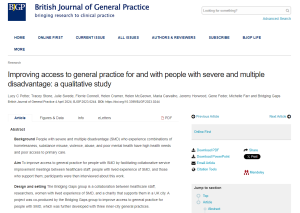Improving access to healthcare for and with people with multiple disadvantage
4 April 2024
General practice teams changed their services to better include patients with severe and multiple disadvantage (SMD) after facilitated collaboration with people with lived experience according to a paper published in the British Journal of General Practice. Implementing these changes brought joy and satisfaction to general practice staff and increased connections with patients and community organisations.
The changes which were implemented using existing funding available to general practices included:
- using care coordinators and a micro-team to advocate and work with a specially created patient list
- prioritising flexible access and longer appointments to patients in greater need
- promoting a trauma-informed approach throughout the whole practice team
People with SMD (combinations of homelessness, substance misuse, violence, abuse, and poor mental health) have high health needs and poor access to primary care. They often fall through the gaps of mainstream general practice, find appointment systems inaccessible and need easier routes into care. They may also experience prejudice and be asked to re-tell their story by multiple members of staff, which can be re-traumatising.
During the project, researchers wanted to answer the following questions:
- What are the key issues and challenges in improving access to general practice for people with SMD?
- What are the potential strategies to improve access to general practice for people with SMD?
To do this the study team co-produced a project to improve access to general practice for people with SMD, called Bridging Gaps . Women with lived experience, those who support them, healthcare researchers and general practice staff worked together on how services could be improved. A researcher independent to the study observed service improvement meetings and interviewed practice staff and participants with lived experience.
Dr Lucy Potter, lead author, said:
“Mainstream general practice is not organised in a way to support patients with SMD. This mismatch exacerbates inequities and results in frustrating encounters for patients and staff, which worsens the problem.
“Specialist clinics and outreach are important resources for marginalised communities, but they are often separated from mainstream services. This means they can’t necessarily offer the full spectrum of care that is needed. We need mainstream primary care to be more inclusive, integrated, and accessible to people with SMD.
“Bringing together motivated general practice staff, people with lived experience and those who support them was a refreshing way to connect and galvanize changes to better include marginalised patients. We have shared the changes that were developed as other areas and practices may wish to try or adapt them.”
Bridging Gaps
Bridging Gaps is a collaboration between healthcare staff, researchers, women with lived experience
of SMD and One25, a charity that supports them in Bristol. Much of our work focuses on how to make services more trauma-informed.
Paper
